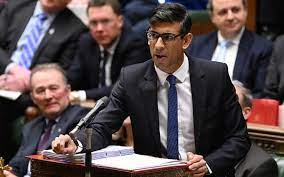Daniel Hannan
What is the biggest threat facing Britain? The war in Ukraine? Chinese cyberattacks? The prospect that the Gaza horrors might spill over into domestic unrest? No. Vaster than any of these is the immediacy of our debt crisis.
If you think that sounds glib, consider that we are now spending more on servicing our national debt than on our entire defence budget. The Government is borrowing at around 5 per cent, a higher rate than at any point since 1998. But with a key difference. In 1998, our total debt was equivalent to about 35 per cent of our economy. Today, it has surpassed 100 per cent, and shows no sign of dropping. A country can keep borrowing sustainably as long as its economy grows as fast as its debt – or, at least, as long as investors believe that it will. But boosting growth requires decisions that are, in the short term, unpopular. And, as Liz Truss found, politicians are no longer prepared to tolerate bad headlines.
In their partial defence, those politicians are accurately representing their electorates. The lockdowns did not just habituate us to handouts. They destroyed our sense of value. How could a government that spent billions of pounds on furlough payments then turn around and deny a much smaller increase in pensions or unemployment benefit or free school meals? Every country faces a variant of the same problem. The closures were costlier than anyone wanted to acknowledge at the time, and were followed by a kind of Long Lockdown: a depression of economic activity that lasted long after restrictions were lifted. We see the impact all around us: higher prices, higher taxes, higher waiting lists, higher absenteeism rates.
Far from roaring back with pent-up energy, the world economy grew by an estimated 3.5 per cent in 2022 and is predicted to grow even more slowly this year. According to the IMF, “beyond 2023, global growth is forecast to decline to about 3.3 per cent over the medium term”. To put that figure in context, growth during the two decades that preceded the pandemic averaged 3.8 per cent.
No wonder bond prices are spiking. British commentators are rarely so parochial as when trying to fit a global trend into their domestic narrative. But, for the hard of thinking, rates have not risen “because of Brexit” or “because Truss crashed the economy”. If anything, Britain is faring slightly less badly than the EU.
No, what we are seeing is a recognition by the bond markets that governments around the world are unwilling to bring public spending into line with economic reality. They are, for the most part, carrying on as if the lockdowns had not happened, as if the trillions conjured into existence through quantitative easing and placed at their disposal reflected actual growth. To put it another way, far from paying off the debts they incurred during the pandemic, governments do not intend even to let spending fall back to where it was in January 2020. The furlough schemes and business grants may have been wound up, but the increases in health and social security spending are being treated as permanent, indeed defended as if they were an ancient birthright. Hence Noel Quinn’s warning last week that the world was at a tipping point. The chief executive of HSBC noted that governments had been on an unprecedented borrowing spree since 2010, first because of the banking crisis and then because of the pandemic. He evidently grasps that spending levels intended as an emergency response to a once-in-a-generation shutdown have been normalised.
When voters, numbed by the gargantuan sums that ministers boasted of during the lockdowns, demand help with fuel bills or mortgages, they don’t mean that they want the Government to cut inflation; they mean they want handouts. Governments find it hard to say no, even though excessive spending is what caused the problem in the first place. We are in a doom loop: higher spending can lead to lower growth, which fuels demand for higher spending. Quantitative easing was introduced in March 2009 as a one-off response to the banking crisis, a nip of whisky to revive us when we were low. But we soon became addicted, pouring ourselves new slugs whenever things looked ropey. Like all addicts, we had to keep increasing the dose. But while staying drunk might stave off the hangover for a while, it makes it worse when it hits.
The Bank of England was unusually irresponsible, but similar things were done by the European Central Bank, the US Federal Reserve and others. The money they created was, in a manner of speaking, borrowed from our future selves. Paying it back was always going to be painful.
The trouble is, we never faced up to the cost of what we were doing. Lockdowns were a holiday from reality, and we enjoyed being paid to stay at home. We don’t appreciate being told that price rises and slow growth rates are the direct consequence of the policies which we – 93 per cent of us, at any rate – demanded.
Instead, we blame the Government, becoming irritated by things that we barely used to notice. The upsurge in Tory sleaze stories is a good example. MPs are probably not behaving any better or worse than usual. But, once we turn against a party, every backbench peccadillo enrages us. It is impossible not to feel sorry for Rishi Sunak. Until now, he has lived a life where intelligence, good manners and hard work were rewarded at every turn: a First from Oxford, a Fulbright Scholarship, Goldman Sachs, a happy marriage, a safe seat, Cabinet in four years, Prime Minister in seven. He is working as diligently as ever (his speech last week on the dangers and opportunities of artificial intelligence was insightful, pertinent and largely unreported) but, somehow, the universe has stopped responding. Sunak’s party conference speech earlier this month saw a series of what ought to have been popular initiatives – dropping impossible targets on boilers and car engines, cracking down on benefit fraud, reducing our reliance on imported oil, bringing school qualifications up to date – but no one cared.
“Long-term decisions for a brighter future” was the clunky conference slogan. But, with our sense of responsibility eroded by the lockdowns and our attention-spans worn away by screen-time, we don’t want long-term decisions. We’d rather have one marshmallow now than two in 15 minutes. Since the Tory conference, Labour has moved even further ahead. On current polling, the Conservatives would hold just 149 seats. The other week’s by-election losses were worse still. Mid-Bedfordshire was the 98th safest Conservative seat, Tamworth the 55th. It was in Tamworth in 1834 that the Conservative Party was born, when Sir Robert Peel addressed himself “to that class which is less interested in the contentions of party than in the maintenance of order and the cause of good government”. For two centuries, Peel’s party has appealed to voters as the responsible party, the adult party, the party that prefers pragmatism to sentimentality, present laughter to Utopian bliss.
Sometimes it works and sometimes, as now, it doesn’t. But, vote how we will, the reckoning that Quinn spoke of is coming. Whoever is in office, the money will run out, and the decisions we have been refusing to countenance – benefits cuts, NHS reform, a higher pension age – will become inescapable. So enjoy your last shot of whisky. The delirium tremens is coming.
The Telegraph







